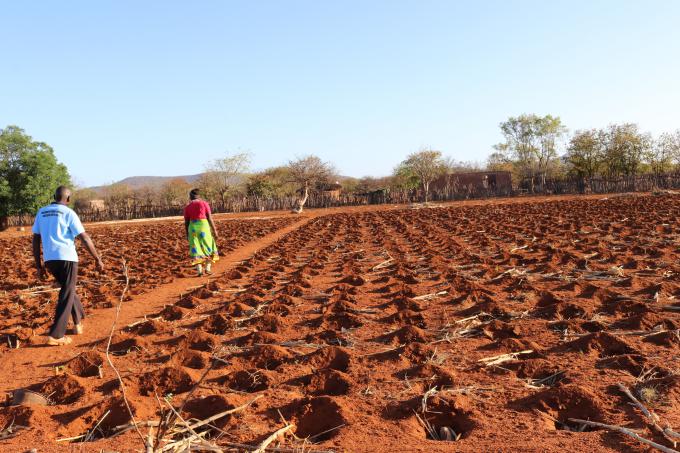Turning to Climate Smart Agriculture to Outsmart Climate Change
Approaching the homestead of Telani and his wife Selina on a hot late afternoon in Beitbridge district, Zimbabwe, one is welcomed by a well prepared field ready for planting season. “We have finished preparing our land. Now we wait for the rains,” alluded Telani.
Most smallholder farmers in rural Zimbabwe depend on rain-fed farming to sufficiently feed their families. However, over the years, the country has experienced challenges related to extremely hot weather conditions, low rainfall patterns, flooding and other climate-induced stresses which led to crop failure leaving many households food insecure. These same farmers have also experienced a devastating blow from the brunt of El-Nino induced droughts which left most livestock herds depleted.
As the world grapples with the impacts of climate change and seeks sustainable solutions to mitigating them, Save the Children in partnership with ICRISAT is scaling up climate smart agriculture in Matobo and Beitbridge districts located in the driest southern regions of Zimbabwe. The initiative is being implemented under the Stepping-up Post-Emergency Recovery and Resilience to Empower Vulnerable Communities in Zimbabwe (SUPER-EVC) project funded by European Union.
Small holder farmers like Telani have been trained by Agricultural Extension Workers under the project, on various smart climate farming techniques which will help them to increase productivity, adapt to the negative effects of climate change and mitigate the effects of climate change on their food production.
“This wealth of knowledge we are getting from this project will relieve us from hunger. In past years we did not harvest much due to low rainfall and most crops wilted in the field. It was hard to put food on the table for our four children.”
“We were trained on farming methods which are suitable for our dry environment and I am already practising these. I have already dug holes and put compost manure inside the holes. This method is said to be an effective way of retaining soil moisture after the rains have long gone. The hole needs to be deep enough so that it retains moisture for some time.”
“I am confident we will have a good harvest next year because we prepared our land differently from what we have been doing in the past years. My children will have enough to eat and this makes me happy,” said Telani.
Telani’s field was recently selected as one of the demonstration plots where other farmers in the village can come and learn more about climate smart farming from the ward based Agricultural Extension Officer.
Drought Resistant Crops for Improved Yields
Drought remains one of the biggest challenges in the provision of food in Zimbabwe. To offer a solution to this problem, the project is also promoting the production of drought tolerant crops for improved food security.
In preparation of the farming season, 4500 households in the two districts have received small grain seeds and fertilisers. The distributed seed package which can survive under the harsh climatic conditions includes, sorghum, millet, groundnuts and velvet beans.
Promise (36) from Chabili village in Beitbridge counts herself lucky to be among the people who received farming inputs.
“I was happy to receive the seed package. If I had not received this seed package, I don’t know what I was going to do because I cannot afford to buy it. I have already prepared my field for the cropping season. We have been getting low yields or nothing at all from maize and other crops because they are not suitable for our environment which experiences low rainfall almost every year.” Promise explained.
“I received 5kg each for sorghum, millet, groundnuts, velvet beans and a 50kg bag of fertiliser. From the trainings, I realised the seeds I received are good for this area as they do not require much water. I hope to harvest enough to last my family till the next farming season,” said Promise.
Partnering to Alleviate Hunger
The project aims to complement government efforts in creating a resilient and food secure community. Save the Children works with the Agricultural Technical and Extension Services (AGRITEX) department in the two districts to reach out to communities with adaptive and transformative farming skills.
“We are happy to be partnering with Save the Children and ICRISAT. These efforts will go a long way in alleviating hunger in our communities as well as to ensure that the environment does not continue to suffer due to harmful farming practices,” said Eunice, an Agricultural Extension Officer in Beitbridge district.
“Under this project, we have been training farmers on conservation farming, water harvesting techniques, supporting the establishment of demonstration plots as well as monitoring how farmers are adopting the new farming technologies.”
“Our farmers appreciate the project and they realise the productivity it brings in their lives,” Eunice alluded.
Save the Children has so far distributed 310.08MT of drought resistant seen and 241.68MT of fertiliser to 4500 farmers, in preparation for the planting, once the rains come.
 Zimbabwe
Zimbabwe 
